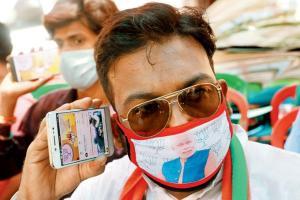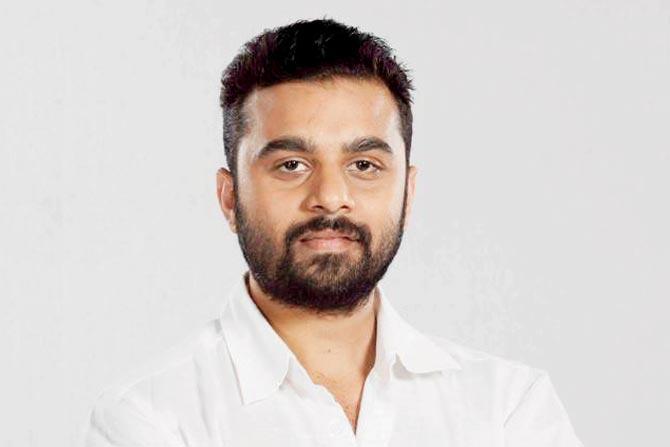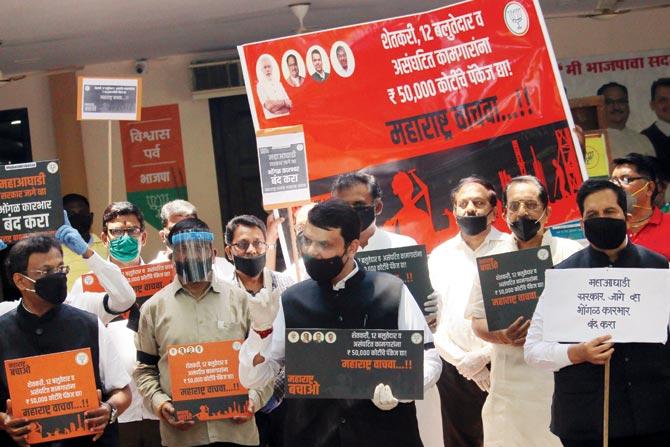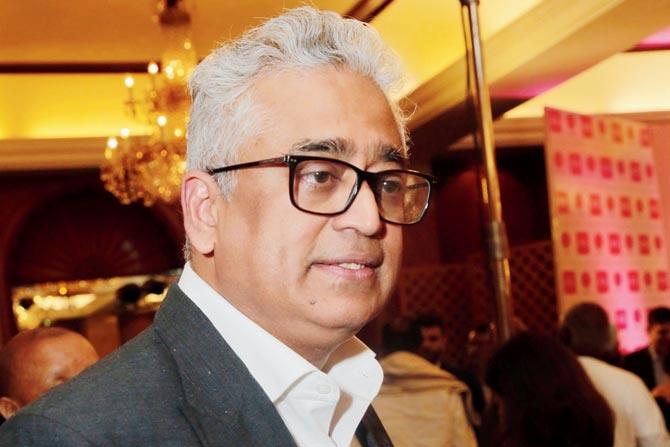Discouraging non-essential commute and ban on gatherings means the politician moved further away from the electorate. Despite pre-COVID WhatsAppisation of Indian politics, can an election be fought in the virtual world?

A BJP supporter wears a Narendra Modi photo mask while tuning in via his mobile phone to home minister Amit Shah's online rally, in Kolkata earlier this month. Pic/ Getty Images
HAD it been any other year, his 30th birthday would have been a grand celebration with supporters and party workers lining up outside Aditya Thackeray's Matoshree residence in Bandra. But, a landmark birthday in 2020 comes with its own limitations. "Adityaji didn't meet anybody and told people to follow [lockdown] norms. The CM was seen driving his own car to reach Mantralaya and BMC headquarters. In fact, his own public engagements were limited to visiting COVID-19 facilities, which was the need of the hour," says Priyanka Chaturvedi, Rajya Sabha MP and deputy leader of the Shiv Sena, which, along with the NCP and Congress forms the ruling coalition, Maha Vikas Aghadi, in Maharashtra.
ADVERTISEMENT

Priyanka Chaturvedi
The Coronavirus-induced pandemic has affected not just how India Inc works, but also changed the country's political and legal landscape. Politicians, as their work requires constant onground presence, and lawyers and judges, because the courts have shut. WhatsApp networks, and meetings on Zoom and WebX have helped shift the workplace from the street to the web.
Chaturvedi, for instance, talks of how since the lockdown was enforced in March, she has been coordinating relief work on the phone. "When our leaders have had to be on ground, they have taken safety measures and maintained social distancing. I live in Goregaon and helped set up a COVID centre with 1,200 beds at Dharavi. The donor was from Africa and the manufacturer was in Vapi. The world came closer despite no one stepping out. I didn't visit Dharavi [which was marked as a containment zone early on in the pandemic after a surge in cases] as it would lead to crowding."
Not visiting a centre they helped set up, is unusual for a politician, she agrees. "The one time I did visit a centre was the one at NESCO in Goregaon along with MP Gajanan Kirtikar. It was imperative for me to be there as the process was getting delayed and we wanted to figure how to smoothen things out," she says, adding, however, that the visit didn't become a photo op. If anything, politicians have had to ensure that they are setting the right example by following lockdown norms.
Across party lines, internal discussions, and meetings between officials of various parties are taking place on commonly used platforms.

Health minister Rajesh Tope and NCP chief Sharad Pawar at MMRDA Grounds, Bandra, in May, with a scant entourage
Speaking of how the BJP has adapted to this, its spokesperson, Keshav Upadhye, says the initial few days threw up tech challenges. "Those who are above 55 years, found it difficult to adapt to the new technology. They had to be guided through downloading the software, understanding it, log ins and passwords and how to talk, for instance," he says, but once the initial hiccups subsided, the going has been smooth. "Now, we are using the same format for assembly wise meetings and ward-level meetings as well."
Many political press conferences have also been conducted online. On how this is arranged, NCP spokesperson Clyde Crasto explains, "Earlier, we would send out a press note with the designated time and venue of the press conference. Different news agencies have a journalist on a particular party's beat. Someone covers Shiv Sena, someone covers Congress, etc. So now, we have a list of journalists who belong to the NCP beat. If there's a PC, a message is sent on the group with the time, date and link to the Zoom meeting ID. And they log in."
Problems persist—poor Internet connections, delayed log ins or multiple people speaking at the same time. And, Crasto says, "It can't replace the in-person connect that one enjoys during face-to-face meetings."
It's the on-ground programmes that have seen a tapered human presence. Many of these, says Crasto, are currently at a standstill. "We had the party's foundation day on June 10. While it was organised, limited people came and physical distance had to be maintained. On a normal day, hundreds would have turned up to hoist the flag," he adds.

Clyde Crasto
During cyclone Nisarga, which hit the Raigad coast earlier this month for instance, Crasto says a lot of workers wanted to help, but weren't able to step out. While local party cadre were out on the field to help the affected, others coordinated relief efforts over the phone.
In Nallasopara, MLA Kshitij Thakur says he and his party workers have been organising food and ration distribution since the beginning of the lockdown. Large kitchens have been organised to cook food for those who need it. To ensure social distancing, groups have been made over WhatsApp. "Smaller WhatsApp groups have been made in various zones and each is connected to the nearest kitchen. The requirement is sent to these kitchens from where distribution happens. Unless there's an emergency, we have told the party workers not to visit the office." The only time he has stepped out in a public gathering was for a blood donation camp, in an attempt to show that it was still safe to donate blood, he felt physical presence would encourage the cause.

Kshiitij Thakur
Where one could walk into a political office to seek help in person, these parties say, their social media presence, built over the last few years helps at a time when non-essential commute is not encouraged. Twitter, Instagram and Facebook can be of help when residents are unable to contact a local party operative or reach out on the helpline numbers of the party websites.
And, while that may hold good for a few months, how will the typical election campaign play out during the time of social distancing?
Senior journalist and author of the title, 2019: How Modi Won India, Rajdeep Sardesai argues that politics by nature is based on contact with the people and in truest form, a politician is a mass politician when s/he goes out and connects with the people and holds rallies and organises demonstrations. "That's gone out of politics because of the Coronavirus, but it went out a bit even before. For a while, with a few notable exceptions, there has been no emergence of the classic old style mass politician. If the 2014 elections changed India, 2019 may well have defined what 'new India' is likely to be all about. In my new book, I take a look at that fascinating story." In the 1970s, he points out, Mumbai had Mrinal Gore and in the 1960s, we had George Fernandes. "But in the recent past, the tradition of politicians hitting the streets to take up people's issues has got lost. With Coronavirus, it has been affected a bit more. Now, it's almost like they have an alibi to stay home. I am interested in seeing how the Bihar elections will be fought a few months from now. Surely, a Bihar election can't be fought in the virtual world. No state is as politicised as Bihar, and I am convinced that in the end, the state's politicos will forget social distancing and hit the road."

Through the lockdown, Opposition leader Devendra Fadnavis has taken many press conferences over video platforms. In this period, on-ground activities saw a limited turnout. PIC/Getty Images
Will parties that have social media networks on Facebook and WhatsApp do better? "The WhatsAppisation of politics happened before Corona and will gain more traction now. WhatsApp helps gain instantaneous traction. BJP had lakhs of WhatsApp groups in the 2019 elections, with a group for every booth. But, will it replace the rally? I don't think so. Earlier, a rally helped create the mahoul [atmosphere] of an election. But now, with social media, the rally will have even less importance than in recent times. There will be a shift from door-to-door campaigning and a greater involvement through social media. This has been true for a few years now."

Rajdeep Sardesai
Sardesai adds that historically, ahead of an election in India, large hoardings would be pasted across the town and campaigning was a festival until the Election Commission cracked down and brought in budgets. "Now, you will find that instead of 10 rallies, people may do only two or three. Instead, they'd rather save that money to spend on much better micro management through technology."
Catch up on all the latest Mumbai news, crime news, current affairs, and a complete guide from food to things to do and events across Mumbai. Also download the new mid-day Android and iOS apps to get latest updates.
Mid-Day is now on Telegram. Click here to join our channel (@middayinfomedialtd) and stay updated with the latest news
 Subscribe today by clicking the link and stay updated with the latest news!" Click here!
Subscribe today by clicking the link and stay updated with the latest news!" Click here!






